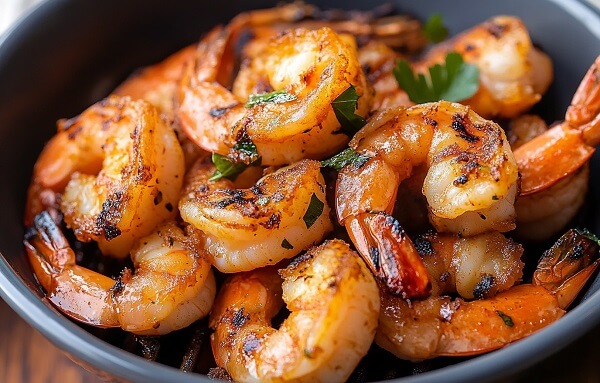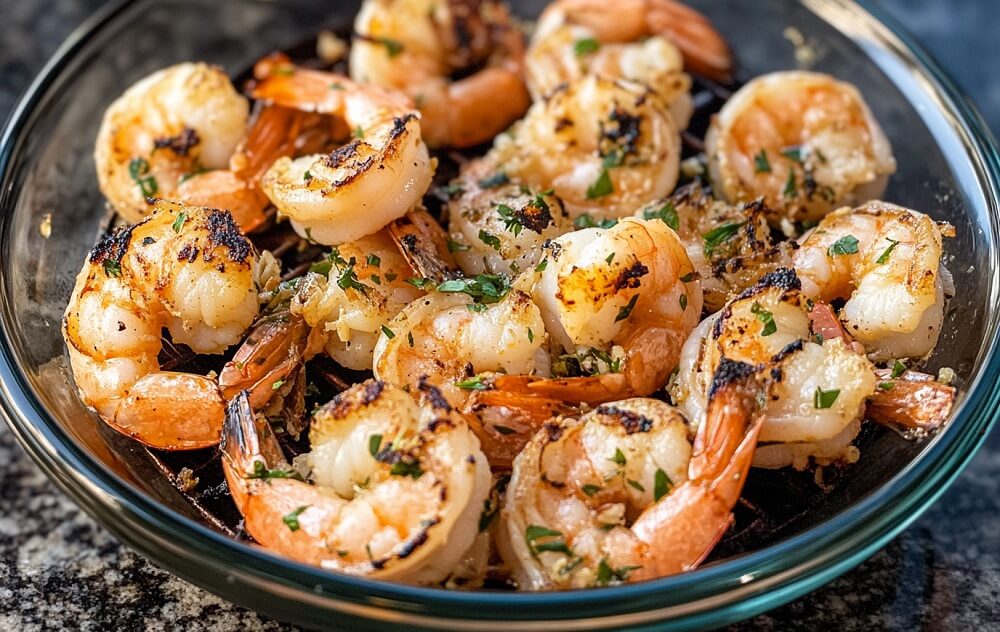Grilling shrimp is a favorite cooking method for seafood lovers, but one key question often arises: Is it better to barbecue shrimp with shell on or off? This debate divides grill enthusiasts, as both methods offer unique benefits and challenges. From achieving a juicy grilled shrimp texture to infusing bold flavors with the right marinades for BBQ shrimp, the choice between shell-on and shell-off grilling techniques can significantly impact your shrimp barbecue experience.
Why Shell Placement Matters:
- Shell-On BBQ Flavor Benefits: Leaving the shell on provides a protective layer, helping retain moisture and deliver that smoky seafood grilling flavor.
- Shell-Off Grilled Shrimp Texture: Grilling shell-off shrimp allows marinades to penetrate deeper, enhancing taste while offering a cleaner eating experience.
Enthusiasts and chefs alike often debate the best way to grill shrimp, as shell placement can influence:
- Juicy grilled shrimp techniques for optimal tenderness.
- Shrimp grilling time and temperature to avoid overcooking.
- The use of marinades for BBQ shrimp to balance flavor and moisture.
Whether you’re aiming for the perfect seafood grilling tips or experimenting with grilling shell-on shrimp, understanding the pros and cons of each method will help you achieve the tastiest results. In the sections ahead, we’ll explore both techniques, their benefits, and expert recommendations.
2. Understanding the Shell: Why It Matters
When grilling shrimp, the shrimp shell plays a crucial role in how the seafood cooks and tastes. Understanding shrimp shell anatomy and its effects on cooking can help you choose the best way to grill shrimp for flavor, moisture, and texture.
Shrimp Shell Anatomy and Cooking Effects
- Shrimp shells are composed of chitin, a hard, natural material that protects the shrimp during cooking.
- When left on, the shell acts as a barrier between the shrimp and direct heat, influencing both texture and taste.
- Grilling shell-on shrimp helps maintain the natural juices and prevents the shrimp from drying out.
How Shells Act as Insulators
- Shrimp shells act as natural insulators by distributing heat evenly, reducing the risk of overcooking.
- This insulation ensures that the shrimp remain tender and moist—a hallmark of juicy grilled shrimp techniques.
- Shell-on shrimp are more forgiving on the grill, making them ideal for beginners and pros alike.
Impact on Taste and Texture
- Shell-on BBQ flavor benefits include a deeper, smoky essence that infuses into the shrimp without burning the meat.
- While shell-off grilled shrimp texture can be tender, it is more prone to becoming rubbery if not carefully monitored.
- Leaving the shell intact preserves flavor and locks in moisture, making the shrimp more succulent.
By understanding how the shell affects cooking, you can decide whether to grill shell-on or shell-off based on the desired shrimp barbecue recipes and techniques.
3. Benefits of Barbecuing Shrimp With Shell On

Choosing to barbecue shrimp with the shell on comes with numerous benefits, especially for achieving juicy, flavorful results. Here are the key advantages of grilling shell-on shrimp:
1. Retains Moisture and Prevents Overcooking
- The shell acts as a protective layer, locking in moisture during grilling.
- Unlike shell-off grilled shrimp texture, shell-on shrimp are less likely to dry out, even under high heat.
- This technique is one of the best seafood grilling tips for retaining tenderness.
2. Adds a Smoky Flavor to the Shrimp
- The shell enhances BBQ flavor benefits by absorbing smoke and heat, which creates a rich, aromatic essence.
- This natural infusion elevates the shrimp’s overall taste without needing excessive seasonings or marinades.
- For a bolder flavor, pair shell-on shrimp with marinades for BBQ shrimp that complement the smokiness.
3. Shell-On Shrimp is Easier to Grill
- Shell-on shrimp are less delicate, making them easier to handle on the grill.
- They are less likely to stick to the grates, making them perfect for barbecue shrimp skewers.
- For beginners, this method simplifies the shrimp grilling time and temperature control process.
4. Examples from Grilling Professionals
Professional chefs often favor grilling shell-on shrimp for its superior moisture retention and flavor.
- Chef techniques highlight using simple marinades for BBQ shrimp and high heat to achieve smoky perfection.
- For instance, a classic technique involves brushing shell-on shrimp with garlic butter or lemon-herb marinade while cooking.
By choosing shell-on grilling, you can achieve juicy grilled shrimp techniques while reducing the risk of overcooking. It’s a tried-and-true method for seafood grilling success, delivering tender, flavorful shrimp every time.
4. Drawbacks of Grilling Shrimp With Shell On
While grilling shell-on shrimp has its advantages, there are a few notable drawbacks that may influence your choice. Here’s why shell-on shrimp might not always be ideal:
1. Difficulty in Peeling During Eating
- One of the biggest challenges of shell-on BBQ shrimp is peeling the shrimp while eating, especially for guests.
- The shell can trap marinades, making it messy to handle and eat.
- For recipes meant for easy enjoyment, like barbecue shrimp skewers, shell-on shrimp may not be practical.
2. Reduced Marinade Absorption
- When the shell is left on, marinades for BBQ shrimp are primarily absorbed by the exterior shell rather than the meat itself.
- This limits flavor infusion, which can be disappointing when using bold or delicate marinades.
- For shrimp recipes requiring intense seasoning, shell-off grilled shrimp texture is better suited.
3. Not Suitable for All Recipes or Preferences
- Some recipes, such as shrimp stir-fry or light shrimp barbecue recipes, require the shrimp to be pre-peeled for cooking or presentation purposes.
- Not everyone enjoys the hassle of peeling shrimp, especially in casual dining settings.
- For quick, seafood grilling tips where ease of eating is a priority, shell-off shrimp are more versatile.
While grilling shell-on shrimp delivers superior moisture and smoky flavor, these drawbacks make it less suitable for certain dishes or preferences. In these cases, choosing shell-off shrimp provides better flexibility for cooking and serving.
5. Benefits of Barbecuing Shrimp With Shell Off
Grilling shrimp with the shell removed comes with unique advantages, especially for flavor penetration and ease of eating. Here are the key benefits of grilling shell-off shrimp:
1. Better Marinade Penetration
- Without the shell acting as a barrier, marinades can fully penetrate the shrimp meat, enhancing flavor.
- Marinades for BBQ shrimp, such as garlic butter, citrus-herb blends, or spicy rubs, work best on shell-off shrimp.
- This ensures every bite is well-seasoned, making it perfect for flavorful shrimp barbecue recipes.
2. Easier to Eat and Enjoy
- Shell-off grilled shrimp texture is tender and easy to enjoy without any peeling required.
- This method works exceptionally well for family gatherings, parties, or quick weeknight meals.
- For serving convenience, shell-off shrimp are ideal for barbecue shrimp skewers, allowing guests to enjoy the meal hassle-free.
3. Perfect for Skewered Shrimp Recipes
- Shell-off shrimp are easier to thread onto skewers, ensuring even cooking and flavor distribution.
- Barbecue shrimp skewers are a great way to showcase shell-off shrimp, especially with complementary marinades like chili-lime or teriyaki.
- Grilling shell-off skewers simplifies the process and offers consistent results for juicy grilled shrimp techniques.
4. Versatility in Recipes
- Shell-off shrimp are versatile for a wide range of dishes beyond grilling, such as shrimp tacos, salads, and pastas.
- This flexibility allows for easy transitions between seafood grilling tips and other cooking methods.
By opting for shell-off grilled shrimp, you can enjoy better flavor infusion, easy preparation, and improved eating convenience. Whether you’re using shrimp grilling time and temperature guidelines for skewers or experimenting with new shrimp barbecue recipes, shell-off shrimp provide excellent results for any occasion.
6. Drawbacks of Grilling Shrimp With Shell Off
While grilling shell-off shrimp offers benefits like better marinade penetration and ease of eating, there are several notable drawbacks to consider:
1. Higher Risk of Drying Out
- Without the protective shell, shrimp are directly exposed to the heat, making them more prone to overcooking.
- Shrimp cook very quickly, and shell-off shrimp can go from juicy grilled shrimp to tough and rubbery in seconds.
- Following precise shrimp grilling time and temperature is essential to avoid drying out the shrimp.
2. Loss of Smoky Flavor from Direct Flame
- The shell plays a key role in capturing and enhancing the BBQ flavor benefits by absorbing smoke and heat.
- With shell-off grilled shrimp texture, the direct exposure can result in less of that smoky essence that enhances seafood on the grill.
- The absence of the shell reduces the depth of flavor that many grill enthusiasts seek in shrimp barbecue recipes.
3. Requires More Careful Grilling Techniques
- Shell-off shrimp are more delicate and can stick to the grill, requiring careful handling.
- Advanced juicy grilled shrimp techniques, like proper oiling of grates and frequent turning, are often needed to prevent burning.
- Using barbecue shrimp skewers can help, but shell-off shrimp still require constant attention during grilling.
While grilling shell-off shrimp offers flavor versatility, the risk of drying out and the loss of smoky BBQ flavor make it a slightly more challenging option. Grilling success with shell-off shrimp depends on precise timing, attention to technique, and careful preparation.
7. Shell On vs. Shell Off: Which is Better for BBQ Flavor?
When it comes to grilling shrimp, the choice between shell-on and shell-off significantly impacts the flavor, texture, and ease of cooking. Let’s compare both methods to determine which delivers the best BBQ shrimp flavor.
Comparison of Taste
- Shell-On Shrimp: The shell enhances BBQ flavor benefits by trapping smoky essence and juices during grilling. This leads to a deeper, more robust flavor profile.
- Shell-Off Shrimp: While shell-off shrimp absorb marinades for BBQ shrimp better, they lack the natural smokiness provided by the shell.
Comparison of Texture
- Shell-On Shrimp: The shell acts as insulation, preventing the shrimp from drying out and delivering a more juicy grilled shrimp texture.
- Shell-Off Shrimp: Without the shell, shrimp are more prone to becoming dry or rubbery, requiring precise shrimp grilling time and temperature.
Grilling Ease
- Shell-On: Easier to grill due to the protective shell. Shrimp are less likely to stick to the grates or fall apart.
- Shell-Off: Requires careful handling and techniques to avoid sticking and burning. Using barbecue shrimp skewers can help simplify grilling.
Recommendations from Chefs and Experts
- Many chefs prefer grilling shell-on shrimp for its superior flavor retention and juiciness, especially when using direct heat.
- However, shell-off shrimp are recommended for recipes requiring heavy marinades or when serving guests who prefer convenience.
Results from Taste Tests and Examples
- Taste tests often favor grilling shell-on shrimp for its rich, smoky flavor and tender texture.
- In real-world scenarios, shrimp barbecue recipes using shell-off shrimp perform better when flavor absorption is the priority, such as citrus-herb or garlic marinades.
Final Verdict
- For maximum BBQ flavor benefits, grilling shell-on shrimp is the better option, especially for smoky, juicy results.
- For recipes requiring bold marinades or convenience, shell-off grilled shrimp offers more flexibility.
Both methods have their place on the grill, and choosing the right approach depends on your preference for flavor, texture, and ease of eating.
8. Best Practices for Grilling Shrimp
Perfecting your shrimp grilling technique ensures juicy, flavorful results every time. Whether you’re grilling shell-on or shell-off shrimp, these best practices will help you achieve the ideal shrimp barbecue recipes.
Choosing the Right Shrimp Size
- Medium to large shrimp (21–30 count per pound) are ideal for grilling.
- Larger shrimp hold up better to high heat and are easier to manage on the grill.
- Small shrimp cook too quickly and can dry out, even with juicy grilled shrimp techniques.
Ideal Marinades and Seasonings
- Shell-On Shrimp: Use bold marinades that enhance the exterior while the shell protects the tender meat.
- Examples: Garlic butter, chili-lime, or soy-ginger marinades.
- Shell-Off Shrimp: Use lighter marinades for deeper penetration into the meat.
- Examples: Lemon herb, citrus, or spicy Cajun rubs.
- Avoid over-marinating (no longer than 30 minutes for peeled shrimp) to prevent the meat from becoming mushy.
Temperature and Grilling Times
- Preheat the Grill: Heat to medium-high (375°F–400°F) for even cooking. A clean, oiled grate prevents sticking.
- Shell-On Shrimp: Grill for 2–3 minutes per side. The shell insulates the meat, reducing the risk of overcooking.
- Shell-Off Shrimp: Grill for 1–2 minutes per side. Monitor closely to prevent drying out.
Grilling Techniques
- Direct Heat: Place shrimp directly over the flame for quick cooking and smoky flavor.
- Use Skewers: Thread shrimp onto barbecue shrimp skewers to make flipping easier and prevent shrimp from falling through the grates.
- Basting: For marinades for BBQ shrimp, baste shell-on shrimp while grilling to infuse additional flavor without peeling.
By following these best practices, you can achieve perfectly cooked shrimp with a juicy grilled shrimp texture. Whether you prefer the smoky shell-on BBQ flavor benefits or the tender, seasoned taste of shell-off grilled shrimp, mastering these techniques will make your next seafood barbecue a success.
9. Tips for Marinating Shell-On Shrimp
Marinating shell-on shrimp is an excellent way to enhance flavor while preserving moisture. However, because the shell acts as a barrier, it’s important to use the right techniques to maximize taste.
Best Marinades for Flavor Infusion
Shell-on shrimp pair well with bold, aromatic marinades that can penetrate the shell while adding flavor to the exterior. Here are some ideal options:
- Garlic Butter Marinade: A mix of melted butter, minced garlic, lemon juice, and fresh parsley.
- Chili-Lime Marinade: A combination of lime juice, chili flakes, garlic, and olive oil for a zesty kick.
- Soy-Ginger Marinade: Soy sauce, ginger, sesame oil, and a splash of honey for a balance of salty and sweet.
Techniques to Maximize Taste Without Peeling the Shell
- Score the Shell: Make small slits along the back of the shell to allow the marinade to penetrate deeper while keeping the shell intact.
- Toss and Rest: Coat the shrimp generously with marinade and let them rest for 30–60 minutes in the refrigerator. This gives the flavors time to seep in.
- Baste While Grilling: Brush the marinade onto the shell while grilling to enhance the BBQ flavor benefits. This step adds a smoky, flavorful layer to the exterior.
- Use Strong Flavors: Bold seasonings like garlic, chili, or citrus work best for grilling shell-on shrimp since the shell can mute lighter flavors.
By scoring the shell and basting frequently, you can ensure that marinades for BBQ shrimp infuse deeply into the shrimp meat while maintaining the juicy grilled shrimp texture. These techniques will elevate your seafood grilling tips and make your shell-on shrimp a flavorful, crowd-pleasing dish.
10. Step-by-Step Guide: Grilling Shrimp With Shell Off
Grilling shell-off shrimp is perfect when you want deep marinade penetration and easy-to-eat results. Follow this step-by-step guide for tender, flavorful shrimp every time.
Step 1: Preparing Peeled Shrimp
- Clean the Shrimp: Remove the shells and devein the shrimp by making a slit along the back and pulling out the vein.
- Dry the Shrimp: Pat the shrimp dry with paper towels. Dry shrimp ensure better seasoning adhesion and prevent sticking to the grill.
- Skewering Tip: Use barbecue shrimp skewers to thread the shrimp. This makes flipping easier and prevents shrimp from falling through the grates.
Step 2: Marinade and Seasoning Options
Without the shell, shrimp absorb marinades quickly, enhancing their flavor. Avoid marinating for more than 30 minutes to prevent the shrimp from becoming mushy.
- Garlic Lemon Herb: Olive oil, minced garlic, lemon juice, parsley, and thyme.
- Spicy Cajun Rub: Paprika, cayenne pepper, garlic powder, and salt mixed with olive oil.
- Chili Honey Lime: Lime juice, honey, chili flakes, and olive oil for a tangy-sweet kick.
Step 3: Grilling Process for Tender Shrimp
- Preheat the Grill: Heat your grill to medium-high (375–400°F) and lightly oil the grates to prevent sticking.
- Season the Shrimp: Toss the shrimp in your marinade or rub just before grilling.
- Grill the Shrimp: Place the shrimp directly on the grill or on skewers.
- Grill for 1–2 minutes per side, flipping once.
- Shrimp are done when they turn opaque and slightly pink with grill marks.
- Avoid Overcooking: Watch closely, as shrimp cook quickly. Overcooked shrimp become tough and rubbery.
Finishing Touch
- Baste the shrimp with leftover marinade while grilling for extra flavor.
- Serve immediately with fresh herbs, lemon wedges, or a dipping sauce.
By following this process, you can enjoy juicy grilled shrimp techniques without the hassle of peeling during eating. Shell-off grilled shrimp texture combined with flavorful marinades makes this method a crowd-pleaser for any barbecue.
11. FAQs
1. Should shrimp be peeled before grilling?
It depends on your preference:
- Shell-on shrimp retain moisture and deliver a smoky flavor.
- Shell-off shrimp absorb marinades better and are easier to eat.
2. Does grilling shrimp with the shell on make it juicier?
Yes. The shell acts as insulation, keeping the shrimp tender and juicy while preventing overcooking.
3. How do you keep shrimp from sticking to the grill?
- Preheat the grill and oil the grates.
- Pat the shrimp dry and brush them with oil or marinade before grilling.
- Use barbecue shrimp skewers for easy flipping.
4. What’s the easiest way to peel grilled shrimp?
- After grilling, hold the shrimp by the tail and gently peel away the shell. If scored before cooking, peeling becomes even easier.
5. Can you eat the shrimp shell after grilling?
Yes, shrimp shells are edible when grilled, especially if seasoned. They add a crunchy texture and enhanced BBQ flavor benefits.
12. Conclusion
Grilling shrimp is a versatile and flavorful way to enjoy seafood, whether you choose shell-on or shell-off grilling techniques.
- Grilling shell-on shrimp retains moisture, prevents overcooking, and enhances smoky flavors, but it can be more challenging to eat and limits marinade absorption.
- Shell-off grilled shrimp texture allows for deeper flavor infusion and easy enjoyment but requires careful grilling to avoid dryness.
Ultimately, the best way to grill shrimp comes down to your preference:
- For juicy, smoky shrimp, go with shell-on BBQ flavor benefits.
- For marinaded, tender shrimp that’s easy to eat, opt for shell-off grilled shrimp.
With the right techniques, including proper shrimp grilling time and temperature and flavorful marinades for BBQ shrimp, you can create delicious shrimp barbecue recipes that everyone will enjoy. Whether you’re using seafood grilling tips for shell-on or shell-off shrimp, both methods deliver mouthwatering results perfect for any occasion.






